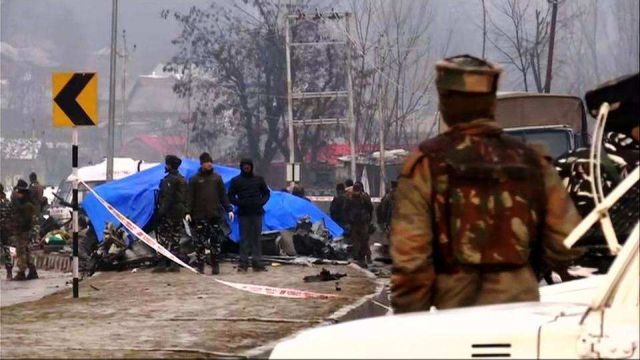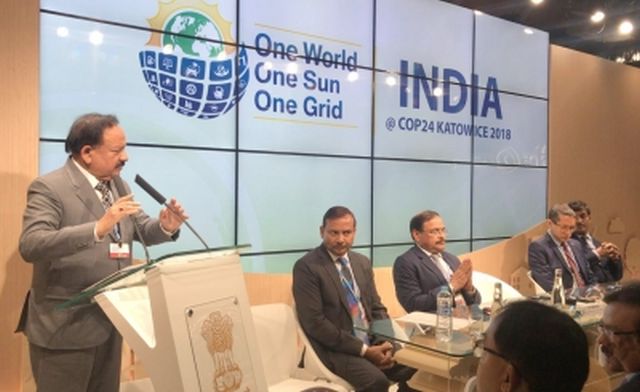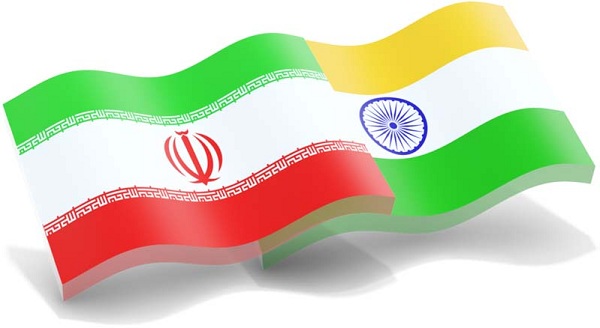
by admin | May 25, 2021 | News
 New Delhi : The international community has strongly condemned the terror attack by the Pakistan-based Jaish-e-Mohammed (JeM) in Jammu and Kashmir that killed 45 CRPF personnel, with US President Donald Trump asking Pakistan to “end immediately” the support and safe haven provided to all terrorist groups operating on its soil.
New Delhi : The international community has strongly condemned the terror attack by the Pakistan-based Jaish-e-Mohammed (JeM) in Jammu and Kashmir that killed 45 CRPF personnel, with US President Donald Trump asking Pakistan to “end immediately” the support and safe haven provided to all terrorist groups operating on its soil.
“The US calls on Pakistan to end immediately the support and safe haven provided to all terrorist groups operating on its soil, whose only goal is to sow chaos, violence and terror in the region. This attack only strengthens our resolve to bolster counter-terrorism cooperation and coordination between the US and India,” Trump’s Press Secretary Sarah Sanders said in a statement.
“We express our deep condolences to the victims’ families, the Indian government and the Indian people for the loss of life in this brutal attack,” the statement added.
China’s Foreign Ministry on Friday also denounced the attack, hoping that “relevant regional countries will cooperate to cope with the threat of terrorism and jointly uphold regional peace and stability”.
It added that the “JeM has been included in the UN Security Council terrorism sanctions list and that China will continue to handle the relevant sanctions issue in a constructive and responsible manner”.
An operative of the JeM group crashed a car bomb into a convoy of the Central Reserve Police Force (CRPF) in Pulwama district on the Srinagar-Jammu Highway on Thursday, making it the worst ever attack on security forces on any single day since a separatist campaign broke out in Jammu and Kashmir in 1989.
Afghanistan’s President Ashraf Ghani and Chief Executive Abdullah Abdullah stressed the “need for solidarity and closer cooperation of countries in the fight against this common enemy”.
“Terrorism is a cancer in the region and it requires collective efforts to root it out,” Ghani said.
Russian President Vladimir Putin, in a message to Prime Minister Narendra Modi strongly condemned the “brutal crime” and said that “the perpetrators and sponsors of the attack, undoubtedly, should be duly punished”.
Putin reiterated Moscow’s “readiness for further strengthening counter-terrorist cooperation with Indian partners”.
The European Union in a statement said that “as a strategic partner of India, the EU reaffirms its full solidarity at such a difficult moment”.
Saudi Arabia also denounced the “cowardly” attack and said it stands with India against terrorism and extremism.
Canadian Foreign Minister Chrystia Freeland said her country “remains steadfast in its support of the global fight against terrorism,” reaffirming a resolve “to prevent radicalization and defeat terrorism in all its forms”.
Indonesia and Australia also slammed the strike.
The attack further damaged the already tense India-Pakistan diplomatic relations, with New Delhi saying it had evidence of Islamabad’s involvement in the carnage. It also withdrew the Most Favoured Nation trade status it had granted to Pakistan in 1996 under the World Trade Organization rules.
However, Pakistan dismissed accusations that it has links with the militants who carried out the attack. “We strongly reject any insinuation by elements in the Indian government and media circles that seek to link the attack to the State of Pakistan without investigations,” said the country’s Foreign Ministry in a statement.
—IANS

by admin | May 25, 2021 | Economy, News
 By Vishal Gulati,
By Vishal Gulati,
New Delhi : Clearing the smoke of uncertainty over the issue of a cleaner environment, India this year succeeded in its multilateral diplomacy to evolve a roadmap for the international community to decisively address climate change.
Also, India’s success in renewable energy auctions, in reducing emissions besides its largest commitment to eliminate all single-use plastic in the country by 2022, has enabled it to win accolades globally.
Even the Indian private sector is not lagging behind in joining the ranks of leading global companies that have committed to set a scientific target to be carbon negative.
Experts believe it’s a win-win situation for India as its success in the just concluded diplomatic intrigues in the coalfields of Katowice in Poland lies in promoting a more fine-tuned form of responsibility — not just among countries, but within them as well.
Eventually, the 24th Conference of Parties to the United Nations Framework Convention on Climate Change, or COP24, produced a deal that paves the way for implementing the 2015 Paris Agreement, which is supposed to replace the existing Kyoto Protocol in 2020.
Voicing its reservations at the COP24 talks, which saw a holdback due to certain objections of the US, Russia, Saudi Arabia, Kuwait, Brazil and Turkey, India went vocal over the lack of equity in the rules relating to the global stocktaking in the rulebook that implements the 2015 Paris Climate Change Agreement.
In the same breath, India signaled that it is ready to update its nationally determined contributions or NDCs if other countries also do so.
Also playing a crucial role to mitigate climate change and other environmental challenges, India in June announced it would strengthen its support with a 25 per cent increase over its contribution to the $15 million Global Environment Facility’s new investment cycle.
India has committed that by 2030, as much as 40 per cent of its installed energy capacity will be based on non-fossil fuels.
India has also won global accolades for opting for green technologies.
India is on track to meet a majority of its Paris goals and become a global climate leader by meeting its targets a decade earlier, US-based Institute for Energy Economics and Financial Analysis (IEEFA) said in a report on the margins of COP24.
The Paris agreement enjoins each country to outline, update and communicate its post-2020 NDCs reflecting its ambition for reducing emissions.
According to IEEFA, India’s NDCs included three key targets: To achieve 40 per cent of electric power installed capacity from non-fossil fuels by 2030, to reduce the emissions intensity of its gross domestic product by 33-35 per cent from the 2005 level by 2030 and to create an additional 2.5-3 billion tonnes of carbon sinks — reservoirs that accumulate and store carbon dioxide — through the planting of additional forest and tree cover.
R.R. Rashmi, India’s former climate negotiator and now a Fellow at The Energy Resource Institute (TERI), told IANS at COP24: “In terms of India’s efforts in reducing its emissions relative to its economic growth, it is a fairly positive story and it is more significant because the energy growth is tremendous.”
Even the World Bank praised India’s success in renewable energy auctions that delivered record-setting low prices for solar power.
“There is a great opportunity now for countries to learn from each other to accelerate the uptake of good policies,” said Riccardo Puliti, Senior Director for Energy and Extractives at the World Bank, in a report this month.
“For example, how did India structure its renewable energy auctions to deliver record-setting low prices for solar?”
A Germanwatch report says carbon dioxide emissions are rising again globally but India’s ranking has improved by three points.
But India moved to 11th rank from last year’s 14th as a result of improved performance in renewable energy, comparatively low levels of per capita emissions and a relatively ambitious mitigation target for 2030, said Germanwatch’s Climate Change Performance Index 2019.
Even India’s private sector is not lagging in committing carbon neutral targets.
Taking the lead, Mahindra & Mahindra, the leading manufacturer of utility vehicles and part of the $20.7 billion Mahindra Group, announced its commitment to become a carbon neutral company by 2040.
Mahindra Group Chairman Anand Mahindra announced this at the Global Climate Action Summit (GCAS) in San Francisco in September.
Likewise, India’s Dalmia Cement Group CEO Mahendra Singhi announced at the GCAS that the company too aims to be carbon negative by 2040.
On the political front, Prime Minister Narendra Modi was selected for this year’s Champions of the Earth award — the UN’s highest environmental honour — along with French President Emmanuel Macron.
(Vishal Gulati can be contacted at vishal.g@ians.in)
—IANS

by admin | May 25, 2021 | World
 By Arul Louis,
By Arul Louis,
United Nations : India has called attention to the Pakistan-North Korea nuclear-missile nexus and said the international community should act against those involved in such deals.
“The international community should take a united stand against those who indulge in or benefit from clandestine (nuclear) proliferation linkages,” Amandeep Singh Gill, India’s principal disarmament affairs diplomat, told the General Assembly’s Committee on Disarmament on Thursday.
“India also remains concerned about proliferation of nuclear and missile technologies, which has adversely impacted India’s national security,” he said while expressing concern over North Korea’s nuclear activities.
Although he did not name Pakistan, the implications of the remark were clear in the context of Pyongyang’s nuclear tests.
The two countries have traded missile technology for nuclear know-how with Islamabad’s top atomic scientist Abdul Qadeer Khan playing a key role.
Pakistan’s nuclear-for-missile technologies cooperation going back to at least the 1990s has been confirmed by United States officials and documented by US and international media.
Gill’s statement follows India’s External Affairs Minister Sushma Swaraj’s call last month for an investigation into the nuclear-for-missile ties between those two countries when she participated in a tri-lateral meeting with US Secretary of State Rex Tillerson and Japanese Foreign Minister Taro Kono.
She did not name Pakistan either, but hinting at it she said that North Korea’s proliferation linkages must be explored and those involved be held accountable.
Gill, who is India’s Permanent Representative to the Conference on Disarmament, said: “It is a matter of deep concern that DPRK (Democratic People’s Republic of Korea) has acted in violation of its international commitments.
“We call upon DPRK to refrain from such actions which adversely impact peace and stability in the region and beyond,” he said.
Gill also denounced an effort by Mexico and five other countries that call themselves the “New Agenda Coalition” to move a resolution demanding that India give up its nuclear weapons and sign the Nuclear Non-proliferation Treaty (NPT).
“The question of India joining the NPT as NNWS (non-nuclear weapon states) does not arise,” Gill said. “At the same time, we support upholding and strengthening global non-proliferation objectives.”
Speaking on behalf of the group, Mexico’s Alternate Permanent Representative Juan Sandoval Mendiolea said on Wednesday that their resolution would urge “India, Israel and Pakistan to accede to the (Non-Proliferation) Treaty as non-nuclear-weapon states promptly and without conditions, and to place all their nuclear facilities under International Atomic Energy Agency safeguards.”
The group that includes Brazil, Egypt, Ireland, New Zealand, South Africa and Mexico did not make a similar demand on the other nuclear powers, Britain, China, France, Russia and the United States – or even North Korea.
“We have updated our agenda and we hope our friends will renew theirs and focus on the real implementation deficits on non-proliferation and disarmament,” Gill said.
Although it was not a party to the NPT, he said that “India abides by the principles and objectives of the NPT, including its nuclear disarmament aspirations. India is committed to making its contribution to strengthening non-proliferation.”
Gill reiterated India’s commitment “as a responsible nuclear power” to “a policy of credible minimum deterrence based on a No First Use posture and non-use of nuclear weapons against non-nuclear weapon states”.
“We remain committed to maintaining a unilateral voluntary moratorium on nuclear explosive testing,” he added.
(Arul Louis can be reached at arul.l@ians.in)
—IANS

by admin | May 25, 2021 | Opinions

By Chaitanya Mallapur
New Delhi: India hopes for a new business bonanza from Iran after the international community agreed to release a nine-year-old sanctions and trade embargo.
Iran’s Foreign Minister Javad Zarif visits India on August 14, the first ministerial visit to India after Iran signed a historic and controversial nuclear deal with the West on July 14. India has welcomed the nuclear deal.
Zarif is expected to meet Prime Minister Narendra Modi, External Affairs Minister Sushma Swaraj and Transport Minister Nitin Gadkari.
Here are some benefits predicted for India:
* India’s exports to Iran are expected to jump over a third to $6 billion this financial year, according to this report (However, some traders fear competition from global suppliers).
* Iran’s gas reserves, one of the world’s largest, are important for India’s gas-starved power plants, which provide clean energy in a coal-dependent country.
* Iran will offer Indian companies a slew of infrastructure projects, including developing a vital port that will allow access to central Asia and Afghanistan, bypassing hostile Pakistan; and a transport corridor into Russia.
A chance to renew ancient ties
India and Iran shared a border until 1947, and there are ancient cultural and political ties between the two countries. Indeed, Persian was once the language of India’s ruling class.
India and Iran maintained cordial relations during the nine years of United Nations sanctions.
India is Iran’s largest oil importer after China, and the world’s fourth-largest oil consumer. Iran ranks fifth in terms of India’s oil imports from Middle East.
India’s crude oil imports from Iran almost halved from 21 million metric tonnes (MMT) in 2009-10 to 11 MMT in 2014-15. Washington recently acknowledged India’s economic sacrifices in supporting sanctions against Iran.
How India weaned itself off Iranian oil
In May 2012, Hillary Clinton, then US secretary of State, made a short visit to India, which was thought as her farewell trip to New Delhi. Clinton later disclosed in her book “Hard Choices” that the visit was solely to convince India to reduce its reliance on Iranian oil, which India eventually did.
Oil imports from Iran declined 28 percent the following year.
India’s crude oil imports from Iran dropped to zero this March due to US pressure. However, it increased 65 percent in May over the previous year, ahead of the final talks by international negotiators over Iran’s nuclear deal in June, according to a Reuters report.
Complying with US sanctions also affected India’s bilateral trade with Iran.
India’s bilateral trade with Iran increased eight-fold between 2005-06 and 2011-12, from $2 billion to $16 billion, declining to $13 billion in 2014-15.
India’s imports declined 36 percent, from $14 billion in 2011-12 to $9 billion in 2014-15. India’s major commodity import from Iran was mineral fuel-oils (including bituminous substances and mineral waxes) worth $7 billion in 2014-15.
Exports to Iran stood at $4 billion in 2014-15 with cereals – the leading export commodity – worth $1 billion in 2014-15.
Iran’s major purchases in cereals have been basmati rice and sugar, and India has been using the rupee credit for its oil due to restrictions on dollar trades. India is Iran’s top rice supplier.
Iran Can Fulfil India’s Gas Requirements
Iran is an energy-rich country, with the world’s fourth-largest proven reserves of crude oil and one of the world’s largest natural-gas reserves.
A slew of unfolding gas projects is vital to India. Gas-based power accounts for just 10 percent of installed electricity generation capacity. More than 23,000 MW of natural-gas-fired power plants operate at a fraction (20 percent) of capacity due to lack of fuel, IndiaSpend has reported.
India’s Oil and Natural Gas Corporation Videsh (OVL) had discovered the Farzad-B gas field in the Persian Gulf in 2008, which had recoverable gas reserves of an estimated 12.8 trillion cubic feet.
International pressure forced India to quit, after it invested $90 million in exploration, according to this report.
Iran has now reopened the bid, and Indian companies are set to face competition from western firms once sanctions are lifted.
An Iran-Pakistan-India (IPI) gas pipeline project has been under discussion since 2005, but there has been no progress.
Another ambitious project for India is the $4 billion Middle-East-to-India-Deepwater Pipeline (also called the South Asia Gas Enterprise project), expected to supply 31 million cubic meters of gas per day to India once implemented.
The 1,300-km-long pipeline will start from Chahbahar in Iran and Ras Al-Jifan in Oman. After traversing the deep bed of the Arabian Sea and bypassing Pakistan, it will reach Porbandar in Gujarat. The project could also bring Turkmenistan gas to India through a swap arrangement with Iran from a gas field in the Arabian Sea.
Iranian President Hassan Rouhani has offered India an opportunity to invest in infrastructure and connectivity projects worth $8 billion. Rouhani met Modi in July on the sidelines of a BRICS summit in Russia and had suggested a larger role for India.
India signed an agreement with Iran in May 2015 to develop the Chahbahar port on the country’s southeastern coast, which will give India sea-land access to Central Asia and Afghanistan, bypassing Pakistan.
India will invest $85 million to outfit two berths, one as a container terminal, the second as a multi-purpose cargo terminal.
India is also part of the International North-South Transport Corridor, a multimodal transportation system connecting India, Central Asia and Russia via Iran.
The project can reduce cargo-transport time to Russia, from the current 45-60 days to 25-30 days. A successful dry-run was conducted last year.
(In arrangement with IndiaSpend.org, a data-driven, non-profit, public interest journalism platform. Chaitanya Mallapur can be contacted at webmaster@indiaspend.org. (IANS)

 New Delhi : The international community has strongly condemned the terror attack by the Pakistan-based Jaish-e-Mohammed (JeM) in Jammu and Kashmir that killed 45 CRPF personnel, with US President Donald Trump asking Pakistan to “end immediately” the support and safe haven provided to all terrorist groups operating on its soil.
New Delhi : The international community has strongly condemned the terror attack by the Pakistan-based Jaish-e-Mohammed (JeM) in Jammu and Kashmir that killed 45 CRPF personnel, with US President Donald Trump asking Pakistan to “end immediately” the support and safe haven provided to all terrorist groups operating on its soil.


